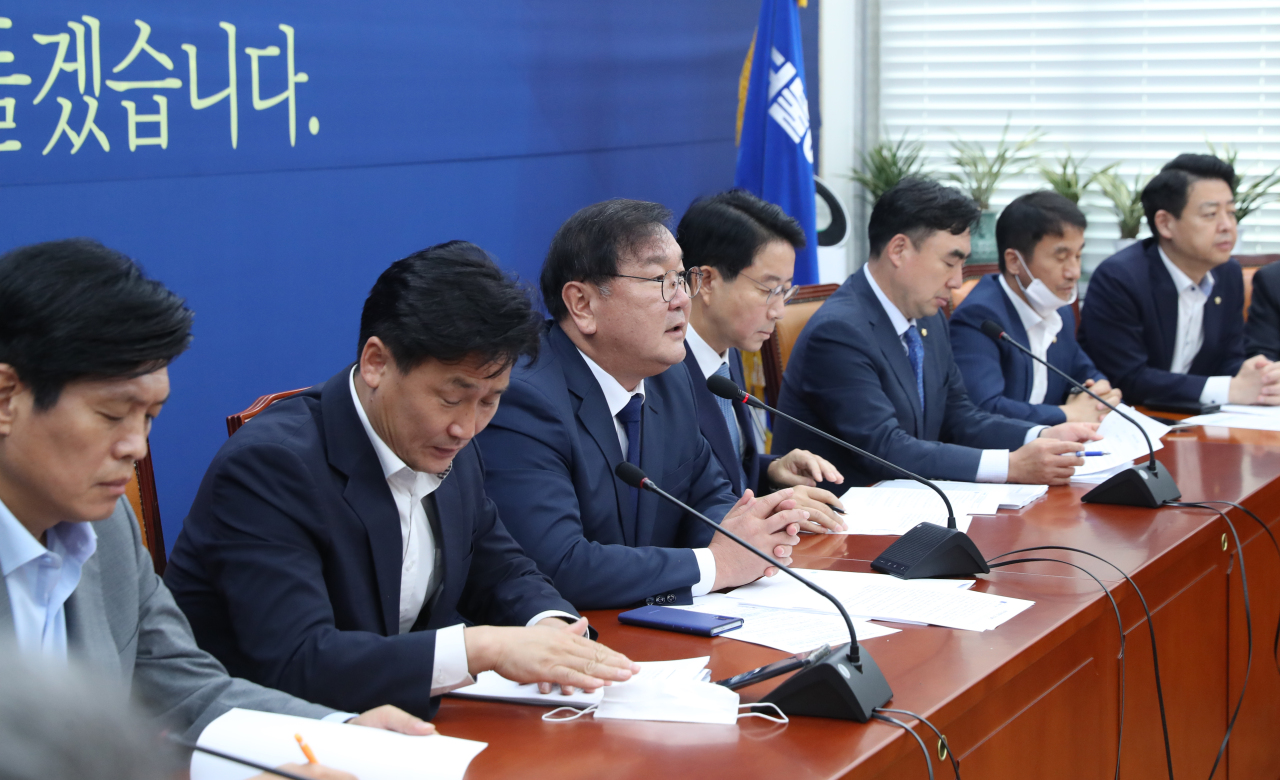 |
Ruling Democratic Party lawmakers including floor leader Rep. Kim Tae-nyeon (third from left) hold a policy meeting on Thursday. Yonhap |
The ruling Democratic Party is leaning towards raising the highest gross real estate tax rate to 6 percent. According to reports citing ruling party officials, the new top tax rate will be included in the party’s latest real estate tax reform measures that could be announced as early as Friday.
At present, the gross real estate tax is levied at rates ranging from 0.5 percent to 3.2 percent, depending on the number, value and location of properties. The government has proposed raising the top rate to 4 percent, but the related bills were not processed by the National Assembly.
A ruling party official told the media that the party is reviewing a number of plans, and that “the strongest measure” and raising the top gross real estate tax rate to 6 percent are being given the most consideration.
The public, however, is divided over raising tax rates on those who own multiple homes, with a Realmeter poll showing 53.5 percent in favor and 41.4 percent against the plans. By region, areas with higher real estate prices appear more evenly divided. Among Seoul residents, 47.9 percent agreed with the plans while 45.2 percent disagreed. Residents of Daejeon, Sejong and Chungcheong Provinces were divided 45.6 percent to 45 percent respectively for and against raising gross real estate tax rates.
As the ruling party scrambles to roll out tougher measures, the fallout from controversy over Moon Jae-in administration’s real estate policies continues to engulf the ruling bloc.
Faced with mounting criticism, talks of holding Minister of Land, Infrastructure and Transport Kim Hyun-mee responsible for lack of results are rising from within the ruling party.
Although the ruling party had until now defended the government’s policies, and by association Kim, some ruling party heavyweights now hint at the possibility of holding Kim responsible.
“Personnel management is up to the president and it is inappropriate for a former prime minister to comment, but the government is likely to have many thoughts,” Rep. Lee Nak-yon said in a radio interview on Thursday, saying that real estate policies have so far failed to bring results.
Lee served as the prime minister until earlier this year, and is now running for the Democratic Party chairmanship.
The ruling party is also moving ahead with plans to reduce the number of multiple homeowners among its lawmakers in line with the party’s pledge ahead of the April 15 general elections.
In naming its candidates for the elections, the ruling party required multiple homeowners to pledge to sell all residential properties with the exception of their residence within two years of being elected.
According to the NGO Citizens’ Coalition for Economic Justice, 39 of 176 ruling party lawmakers own two or more properties.
Although the party reportedly reviewed plans to bring forward the deadline for selling additional properties, party leaders have chosen instead to advise concerned lawmakers to sell properties at the earliest possible time without setting a deadline.
The main opposition United Future Party, meanwhile, is taking a different approach to multiple homeownership among lawmakers with its floor leader Rep. Joo Ho-young claiming that it is maybe necessary.
“A lawmaker needs a residence in Seoul, and also in their constituency, having two necessary properties should not be subjected to criticism,” Joo said in a recent interview. Joo has also stated that lawmakers and government officials being forced to sell properties could be unconstitutional. Of the United Future Party’s 103 lawmakers, 41 own two or more residential properties.
By Choi He-suk (
cheesuk@heraldcorp.com)








